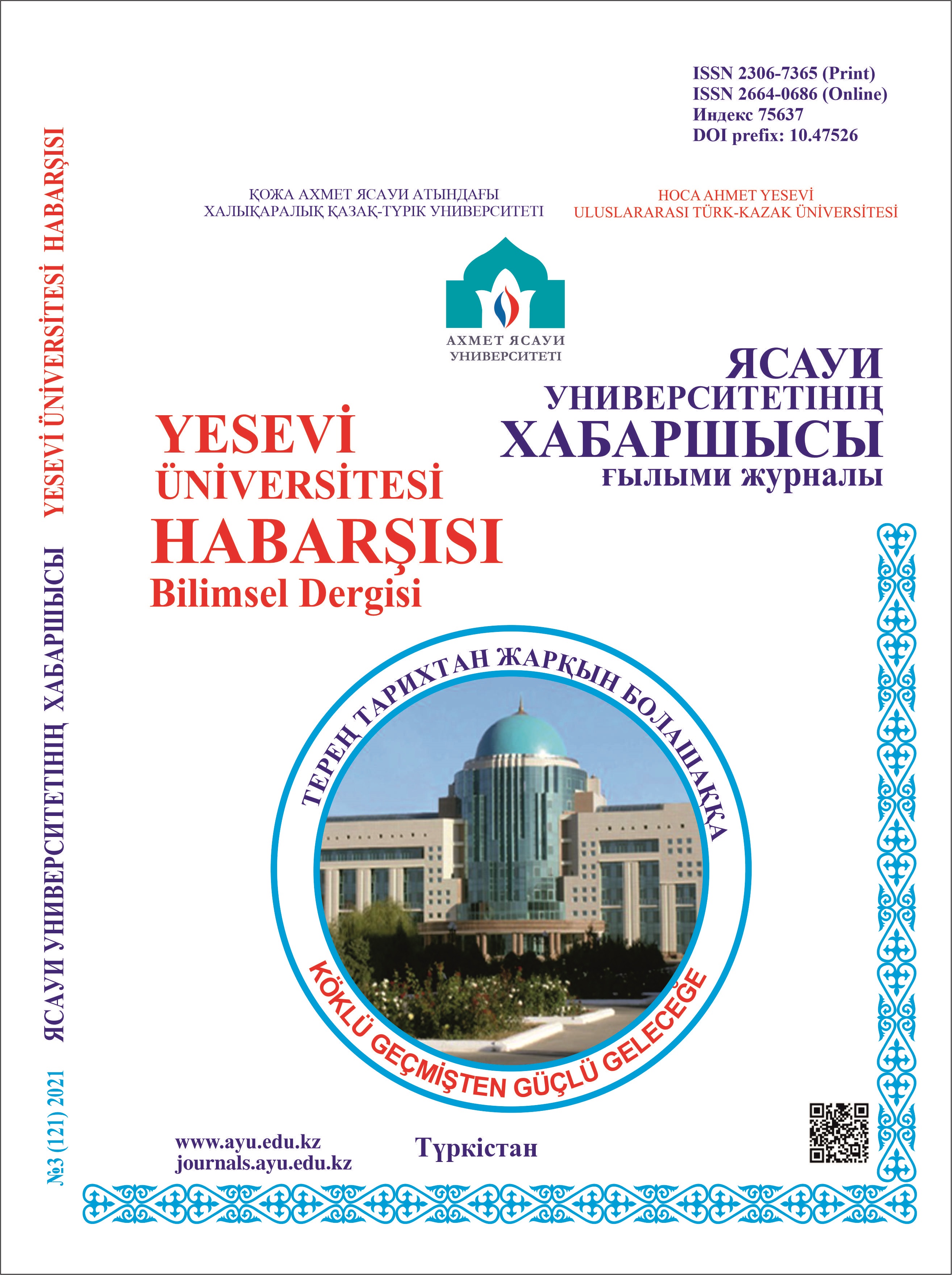Scientific foundations of gender linguistics in kazakhstan
255 201
Keywords:
Gender and linguistics, Kazakhstan, higher education, gender and language, gender studies.Abstract
Theoretical framework and research are essential in addressing the challenges of
integrating linguistics, psychology, sociology, feminist theory, and gender linguistics and providing
tools to analyze the relationship between language and gender. Scientific foundations allow gender
linguistics to deepen understanding of gendered language and contribute to creating more inclusive
societies through education and policy-making.
This study explores gender linguistics in Kazakhstan by focusing on the intersection of
language, gender, and educational practices. The key objective of this study is to provide an
overview of gender and language education in Kazakhstan’s universities, highlighting the content
and structure of the gender linguistics courses. This article aims to contribute to the broader
discourse on integrating gender perspectives into linguistic education. This work also contributes to
the discussion on gender studies in Kazakhstan and provides a theoretical framework for future
research and educational development. The authors used qualitative research methods, particularly
content analysis, to examine the current state, challenges, and opportunities of gender and
linguistics courses in Kazakhstani universities. Data were gathered through official institutional
requests, the digital database “Unified Higher Education Platform,” and course catalogs on the
universities’ official websites. The authors focused on academic courses/programs on “gender and
linguistics” and “gender and language” to identify courses that addressed gender linguistic
frameworks.
The search encompassed over 5,000 active educational programs at the universities of
Kazakhstan listed on the Unified Higher Education Platform. Results indicate that seven
universities in Kazakhstan offer gender linguistics courses and a diverse range of undergraduate and
graduate-level courses. Outcomes also demonstrate that compared to international practices,
Kazakhstani programs often emphasize theoretical aspects without addressing the intersectional
dimensions of gender linguistics.
References
Coates J., Pichler P. Language and gender: a reader. 2nd ed. – Wiley-Blackwell, 2011. – 640 p.
Eckert P., McConnell-Ginet S. Language and gender. 2nd ed. – Cambridge University Press, 2013. –
p.
Lakoff R. Language and woman’s place. Revised and Expanded Edition. – Oxford University Press,
– 310 p.
Bucholtz M., Hall K. Theorizing identity in language and sexuality research // Language in Society. –
– №33(4). – P. 469–515.
Cameron D. Feminism and linguistic theory. 2nd ed. – Macmillan, 1992. – 248 p.
https://doi.org/10.1007/978-1-349-22334-3
Eckert P., McConnell-Ginet S. Think practically and look locally: language and gender as a communitybased practice // Annual Review of Anthropology. – 1992. – №21(1). – P. 461–488.
Tannen D. You just don’t understand: women and men in conversation. – New York: William
Morrow & Co., 1990. – 330 p.
Language and gender. Gender & Sexuality Studies Program. [Electronic resource]. URL:
https://gendersexuality.northwestern.edu/courses/descriptions/234-language-gender.html (date of access
08.2024)
Language, Gender & Sexuality. Stanford Explore Courses. [Electronic resource]. URL:
access 16.08.2024)
Gender and Language. Linguistics Program. [Electronic resource]. URL:
https://linguisticsprogram.duke.edu/courses/gender-and-language (date of access 16.08.2024)
Кириллина А.В. Гендерные исследования в зарубежной и отечественной лингвистике //
Обшественные науки и современность. – 2000. – №4. – С. 138–145.
Кирова А.Г. Развитие гендерных исследований в лигвистике // Вестник Томского
государственного педагогического университета. – 2009. – №8(86). – С. 138–140.
Кирилина А.В., Томская М.В. Лингвистические гендерные исследования сегодня //
Отечественные записки. – 2005. – №2. – С. 78–94.
Хасанулы Б. Гендерные исследования в казахстанской лингвистике // Вестник КазНУ. Серия
филологическая. – 2005. – №3(85). – С. 11–14.
Martynyuk A.P. A constructive study of male and female occupational terms in English and Russian //
Papers and Studies in Contrastive Linguistics. – 1990. – №26. – P. 103–110.
Суюнова Г.С. Межэтническая коммуникация и гендер // В кн.: Гендерная лингвистика. –
Павлодар: Кереку, 2013. – С. 456–479.
Токтарова Т.Ж. Гендерный аспект коммуникативного поведения // Вестник КазНУ. Серия
филологическая. – 2006. – №61. – С. 157–160.
Unified Higher Education Platform. Digital database. https://epvo.kz/#/
Coates J., Pichler P. Language and gender: a reader. 2nd ed. – Wiley-Blackwell, 2011. – 640 p.
Eckert P., McConnell-Ginet S. Language and gender. 2nd ed. – Cambridge University Press, 2013. –
p.
Lakoff R. Language and woman’s place. Revised and Expanded Edition. – Oxford University Press,
– 310 p.
Bucholtz M., Hall K. Theorizing identity in language and sexuality research // Language in Society. –
– №33(4). – P. 469–515.
Cameron D. Feminism and linguistic theory. 2nd ed. – Macmillan, 1992. – 248 p.
https://doi.org/10.1007/978-1-349-22334-3
Eckert P., McConnell-Ginet S. Think practically and look locally: language and gender as a communitybased practice // Annual Review of Anthropology. – 1992. – №21(1). – P. 461–488.
Tannen D. You just don’t understand: women and men in conversation. – New York: William
Morrow & Co., 1990. – 330 p.
Language and gender. Gender & Sexuality Studies Program. [Electronic resource]. URL:
https://gendersexuality.northwestern.edu/courses/descriptions/234-language-gender.html (date of access
08.2024)
Language, Gender & Sexuality. Stanford Explore Courses. [Electronic resource]. URL:
access 16.08.2024)
Gender and Language. Linguistics Program. [Electronic resource]. URL:
https://linguisticsprogram.duke.edu/courses/gender-and-language (date of access 16.08.2024)
Kirillina A.V. Gendernye issledovania v zarubejnoi i otechestvennoi lingvistike [Gender studies in
foreign and deomestic linguistics] // Obshestvennye nauki i sovremennost. – 2000. – №4. – S. 138–145.
[In Russian]
Kirova A.G. Razvitie gendernyh issledovaniy v ligvistike [The development of gender studies in
linguistics] // Vestnik Tomskogo gosudarstvennogo pedagogicheskogo universiteta. – 2009. – №8(86).
– S. 138–140. [In Russian]
Kirilina A.V., Tomskaya M.V. Lingvisticheskie gendernye issledovania segodnia [Linguistic gender
studies today] // Otechestvennye zapiski. – 2005. – №2. – S. 78–94. [In Russian]
Khasanuly B. Gendernye issledovania v kazahstanskoi lingvistike [Gender studies in Kazakhstani
linguistics] // Vestnik KazNU. Seria filologicheskaia. – 2005. – №3(85). – S. 11–14. [In Russian]
Martynyuk A.P. A constructive study of male and female occupational terms in English and Russian //
Papers and Studies in Contrastive Linguistics. – 1990. – №26. – P. 103–110.
Suyunova G.S. Mejetnicheskaia kommunikacia i gender [Interethnic communication and gender] // In:
Gendernaia lingvistika [Gender linguistics] / Ed. Z.K. Temirgazina. – Pavlodar: Kereku, 2013. – S.
–479. [In Russian]
Toktarova T.J. Gendernyi aspekt kommunikativnogo povedenia [Gender aspect of communication
behavior] // Vestnik KazNU. Seria filologicheskaia. – 2006. – №61. – S. 157–160. [In Russian]
Unified Higher Education Platform. Digital database. https://epvo.kz/#/

